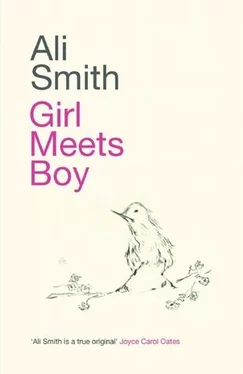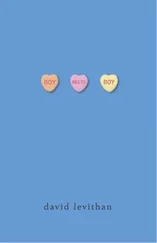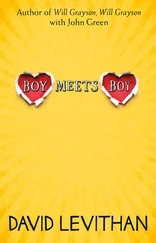I was laughing now too. I turned in her arms and put my head on her laughing collarbone.
Like double oh seven. Daniel Craig in Casino Royal, rising out of the water like that goddess on a shell, I said. Lo and behold.
Ursula Andress did it first, she said. I mean, after Venus herself, that is. In fact, Daniel Craig and Ursula Andress look remarkably alike, when you compare them. No, because last year I used Iphis06. The year before I was Iphis05. God knows what you’d have thought they said. Iffisog. Iffisos.
It had been exciting, first the not knowing what Robin was, then the finding out. The grey area, I’d discovered, had been misnamed: really the grey area was a whole other spectrum of colours new to the eye. She had the swagger of a girl. She blushed like a boy. She had a girl’s toughness. She had a boy’s gentleness. She was as meaty as a girl. She was as graceful as a boy. She was as brave and handsome and rough as a girl. She was as pretty and delicate and dainty as a boy. She turned boys’ heads like a girl. She turned girls’ heads like a boy. She made love like a boy. She made love like a girl. She was so boyish it was girlish, so girlish it was boyish, she made me want to rove the world writing our names on every tree. I had simply never found anyone so right. Sometimes this shocked me so much that I was unable to speak. Sometimes when I looked at her, I had to look away. Already she was like no one else to me. Already I was fearful she would go. I was used to people being snatched away. I was used to the changes that came out of the blue. The old blue, that is. The blue that belonged to the old spectrum.
My grandfather used to say that all the time, lo and behold, I told her. They’re dead, my grandparents. They drowned. This used to be their house.
Tell me about them, she said.
You tell me about you first, I said. Come on. Story of your life.
I will, she said. Yours first.
If my life was a story, I said, it’d start like this: Before she left, my mother gave me a compass. But when I tried to use it, when I was really far out, lost at sea, the compass didn’t work. So I tried the other compass, the one my father had given me before he left. But that compass was broken too.
So you looked out across the deep waters, Robin said. And you decided, by yourself, and with the help of a clear night and some stars, which way was north and which was south and which way was east and which was west. Yes?
Yes, I said.
Then I said it again. Yes.
Now do you want to know mine? she said.
I do, I said.
It begins one day when I come down a ladder off an interventionist act of art protest, and turn round and see the most beautiful person I’ve ever seen. From that moment on, I’m home. It’s as if I’ve been struggling upstream, going against the grain, until that moment. Then we get married, me and the person, and we live together happily ever after, which is impossible, both in story and in life, actually. But we get to. And that’s the message. That’s it. That’s all.
What sort of story’s that? I said.
A very fishy sort, she said.
It sounds a bit lightweight, as stories go, I said.
I can be heavy-handed if you want, she said. Fancy a bit of heavy-handing? Or would you prefer something lighter? You choose.
Then she held me tight.
Lo and be held, she said.
You’re very artful, you, I said.
You’re not so bad yourself, she said.
We woke up. It was light. It was half past two in the morning. We got up and opened the window; we leaned together on the sill and watched the world wake up, and as the birds fought to be heard above one another before all the usual noise of day set in to drown them out she told me the story of Iphis.
A long time ago on the island of Crete a woman was pregnant and when the time came close to her giving birth her husband, a good man, came to her and said, if it’s a boy we’ll keep him, but if it’s a girl we can’t. We can’t afford a girl, she’ll have to be put to death, I’m so sorry, but it’s just the way things are. So the woman went to the temple and prayed to the goddess Isis, who miraculously appeared before her. You’ve been true to me so I’ll be true to you, the goddess said. Bring the child up regardless of what it is and I promise you everything will be fine. So the child was born and it was a girl. The mother brought her up secretly as a boy, calling her Iphis, which was a name both boys and girls could be called. And Iphis went to school and was educated with her friend Ianthe, the beautiful daughter of a fine family, and Iphis and Ianthe grew up looking into each other’s eyes. Love touched their innocent hearts simultaneously and wounded them both, and they were betrothed. As the wedding day approached and the whole of Crete prepared for the celebration, Iphis got more and more worried about how, being a girl like Ianthe, she would ever be able to please her bride, whom she so loved. She worried that she herself would never really enjoy her bride the way she longed to. She complained bitterly to the gods and goddesses about it. On the night before the wedding, Iphis’s mother went back to the temple and asked the goddess to help. As she left the empty temple its walls shook, its doors trembled, Iphis’s jaw lengthened, her stride lengthened, her ribcage widened and broadened, her chest flattened, and the next day, the wedding day, dawned bright and clear and there was rejoicing all over the island of Crete as the boy Iphis gained his own Ianthe.
Though actually, the telling of it went much more like this:
A long time ago, on the island of Crete, Robin said behind me, into my ear –
I’ve been there! We went there! I said. We had a holiday there when we were kids. We spent a lot of it at the hospital in Heraklion, actually, because our dad went to hire a motorbike to impress this woman in a motorbike hire shop, and before he’d hired one he rode it a few yards round a corner to get a feel for it, and fell off it and scraped the skin off half the side of his body.
A long time ago, Robin said, long before motorbike hire, long before motors, long before bikes, long before you, long before me, back before the great tsunami that flattened most of northern Crete and drowned most of the Minoan cities, which, by the way, was probably the incident responsible for the creation of the myth about the lost city of Atlantis –
That’s very interesting, I said.
It is, she said. There’s pumice stone fifty feet up on dry land in parts of Crete, and cow-bones all mixed up with sea-creature remains, far too high for any other geological explanation –
No, I mean that thing about responsibility and creating a myth, I said.
Oh, she said. Well –
I mean, do myths spring fully formed from the imagination and the needs of a society, I said, as if they emerged from society’s subconscious? Or are myths conscious creations by the various money-making forces? For instance, is advertising a new kind of myth-making? Do companies sell their water etc by telling us the right kind of persuasive myth? Is that why people who really don’t need to buy something that’s practically free still go out and buy bottles of it? Will they soon be thinking up a myth to sell us air? And do people, for instance, want to be thin because of a prevailing myth that thinness is more beautiful?
Anth, Robin said. Do you want to hear this story about the boy-girl or don’t you?
I do, I said.
Right. Crete. Way back then, she said. Ready?
Uh huh, I said.
Sure? she said.
Yep, I said.
So there was this woman who was pregnant, and her husband came to her –
Which one was Iphis? I said.
Neither, she said. And her husband said –
What were their names? I said.
Читать дальше












